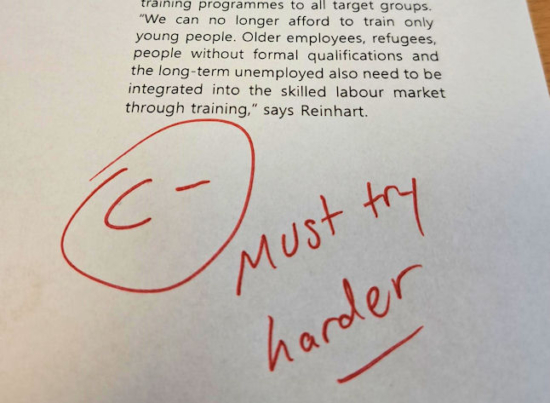Labour shortage: Personal skills & abilities more important than grades, says Conti
 Dr Reinhart opines that school grades are of limited significance with regard to the requirements of individual career paths
Dr Reinhart opines that school grades are of limited significance with regard to the requirements of individual career paths
Companies across Western and Central Europe are struggling to find sufficient skilled labour. Continental is addressing this problem by stressing the importance of in-company, vocational training and of ensuring that this is financially attractive for young people.
“Training is a key tool for combating the skills shortage, which is worsening rapidly. The resulting threat of damage to our economy is huge,” states Dr Ariane Reinhart, Continental’s Executive Board member for Human Relations and Sustainability. Reinhart believes that providing financial assistance and more flexible training models are quick and effective ways of making in-company training more attractive for young people. She suggests that pay for apprentices or trainees in more unpopular occupations could, for example, be exempted from taxes: “For some training programmes, gross pay must equal net pay.”
An unrealistic notion of the working world
“When interacting with young people, we often find that many of them have an outdated and unrealistic notion of certain professions,” adds Hanno Gieseke, training manager for Germany at Continental. “This trend has been by reinforced by the lockdowns, when life for young people in particular was predominantly digital. During this time, many of them adopted exaggerated role models from sports and social media. As a result, they have become increasingly distanced and alienated from the real world of work.”
Training programmes must be broadened
Ariane Reinhart warns companies against imposing “excessive requirements” that deter qualified trainees. “The training market has run dry. Many companies are not in a position to make great demands or to pick and choose when it comes to selecting their trainees,” says Reinhart. “We see valuable talent in many young people, which only needs to be brought out in a targeted manner and then nurtured. The motivation will then come naturally.”
She opines that school grades are of limited significance with regard to the requirements of individual career paths. “A good mechatronics engineer, for instance, does not necessarily have to be a straight A student. Their personal skills and abilities are much more important,” says the Continental Executive Board member. “This is why we carry out a targeted diagnosis for all applicants. At Continental, we refer to this as the ‘best fit’ approach. The ultimate aim here is to ensure equal opportunities for all.”
In view of the growing skills shortage, companies also need to open up their training programmes to all target groups. “We can no longer afford to train only young people. Older employees, refugees, people without formal qualifications and the long-term unemployed also need to be integrated into the skilled labour market through training,” says Reinhart.



Comments